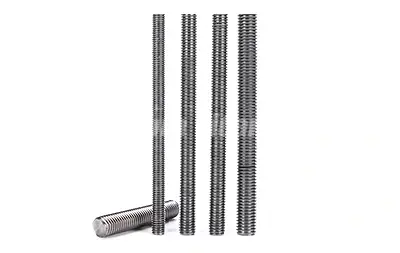
In my role as a material engineer with a specialization in lightweight construction, I often confront inquiries regarding the weight reduction benefits of titanium thread rods. This article endeavors to dissect the scientific rationale behind this question, delving into the intrinsic properties of titanium, its utilization in thread rods, and the potential weight-saving advantages it presents across diverse industries.
Titanium, renowned for its exceptional strength-to-weight ratio, corrosion resistance, and durability, stands as a material of choice in engineering applications demanding high performance and reliability. When employed in thread rods, titanium's lightweight nature becomes particularly advantageous, contributing to reduced overall weight without compromising structural integrity. This attribute proves invaluable across industries where weight considerations play a crucial role, such as aerospace, automotive, and marine sectors.
Furthermore, titanium thread rods exhibit superior resistance to corrosion, ensuring prolonged service life even in harsh environments. This durability factor enhances their suitability for applications subjected to moisture, chemicals, or extreme temperatures, further underscoring their utility in lightweight construction projects.
Understanding Titanium's Properties and Applications in Thread Rods
Titanium is renowned for its exceptional strength-to-weight ratio, corrosion resistance, and biocompatibility, making it a coveted material across a spectrum of industries, including aerospace, automotive, medical, and sports equipment manufacturing. These properties stem from titanium's low density (approximately 60% that of steel) coupled with its high tensile strength, allowing for the creation of lightweight yet durable components.
In the context of thread rods, titanium offers several advantages over traditional materials like steel or stainless steel. Firstly, its low density translates to lighter thread rods, which can significantly reduce the overall weight of assemblies without compromising structural integrity. This weight reduction is particularly crucial in applications where every ounce saved contributes to improved fuel efficiency, enhanced performance, or increased payload capacity.
Titanium's corrosion resistance is paramount, especially in outdoor or corrosive environments where thread rods are exposed to moisture, chemicals, or extreme temperatures. Unlike steel, which may rust or corrode over time, titanium maintains its integrity, ensuring long-term reliability and minimizing maintenance requirements. This inherent resistance to corrosion extends the service life of equipment and structures, reducing downtime and replacement costs—a compelling benefit for industries seeking cost-effective solutions.
Furthermore, titanium's biocompatibility renders it ideal for applications in medical devices, where thread rods may be implanted within the human body for orthopedic or dental procedures. Unlike other metals that may trigger allergic reactions or tissue rejection, titanium exhibits excellent compatibility with biological tissues, promoting healing and integration—a critical factor in the success of medical implants.
Analyzing the Weight Reduction Benefits of Titanium Thread Rods
To assess the weight reduction benefits of titanium thread rods, it is essential to compare them with conventional alternatives such as steel or stainless steel. In this comparative analysis, factors such as material density, tensile strength, and specific application requirements must be considered to determine the optimal choice for a given scenario.
In many cases, the lightweight nature of titanium proves advantageous, particularly in weight-sensitive applications such as aerospace or automotive engineering. For instance, replacing steel thread rods with titanium counterparts in aircraft assemblies can result in substantial weight savings, thereby improving fuel efficiency, increasing payload capacity, and enhancing overall performance. Similarly, in automotive applications, where reducing vehicle weight is paramount for meeting emissions regulations and enhancing fuel economy, titanium thread rods offer a compelling solution.
the high strength-to-weight ratio of titanium allows for the design of thinner and lighter components without sacrificing mechanical performance. This characteristic is especially advantageous in applications where space and weight constraints are critical considerations, such as in high-performance racing vehicles or lightweight structures where minimizing mass is essential for achieving optimal performance.
Furthermore, the durability and corrosion resistance of titanium ensure longevity and reliability in harsh operating environments, further justifying its use in thread rods for outdoor or corrosive applications. By mitigating the risk of corrosion-induced failure, titanium thread rods contribute to increased safety, reduced maintenance costs, and extended service life—an attractive proposition for industries seeking durable and cost-effective solutions.
Conclusion
In conclusion, titanium thread rods offer significant weight reduction benefits backed by their exceptional properties, including low density, high strength, corrosion resistance, and biocompatibility. By leveraging these attributes, titanium thread rods contribute to lighter, more durable, and more reliable assemblies across various industries, ranging from aerospace and automotive engineering to medical device manufacturing.
If you want to know more about Titanium Thread Rods, please contact us: sales@wisdomtitanium.com.
References:
- Lee, J., & Sohn, Y. (2018). Titanium and Titanium Alloys as Lightweight Materials for Aerospace Applications. Metals, 8(5), 398.
- Boyer, R. R. (2005). An overview on the use of titanium in the aerospace industry. Materials Science and Engineering: A, 399(1-2), 148-158.
- ASTM International. (2019). Standard Specification for Titanium and Titanium Alloy Bars and Billets. ASTM B348 / B348M - 19.
- Froes, F. H., & Eylon, D. (Eds.). (2002). Titanium in the aerospace industry: a comprehensive review of the benefits and challenges. ASM International.





